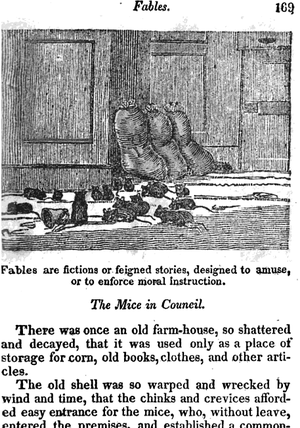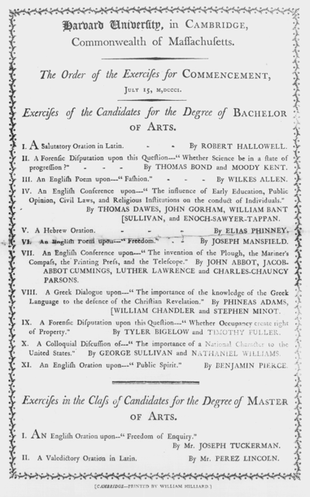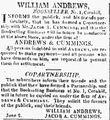Jacob Abbot Cummings
Jacob Abbot Cummings (1773–1820) was a bookseller, publisher, schoolteacher and author in Boston, Massachusetts, in the early 19th-century.[1][2]

Biography
Born in Hollis, New Hampshire,[3] to Ebenezer Cummings and Elizabeth Abbot,[4] Jacob attended Harvard University (class of 1801).[5][6] In 1809 he married Elizabeth Merrill; their children were James Merrill (b. 1810) and John S. (1812–1813).[7]
As a bookseller and publisher, his business partners included William Andrews (Andrews & Cummings, 1807–1809)[8][9] and William Hilliard (Cummings & Hilliard, 1812–1820)[10]
Cummings "kept a school for both girls and boys" in Boston. He "seems to have been ahead of his time in both the style and content of his teaching. ... He wrote a textbook, An Introduction to Ancient and Modern Geography, giving something of his pedagogical philosophy in the preface. 'It will not be profitable to confine the young mind long to any one part of the earth. ... No small injury is frequently done to young persons, by attempting to make them perfect in what they the first time commit to memory, especially if it be somewhat difficult.'" He also liked the bible "as a reading text because of its simple dialogue, short sentences, frequent transitions, and interesting narrative. He wrote that the children kept 'hoping on every perusal that scenes of sorrow and death may be reversed and the innocent sufferer escape.'"[11]
After his death in 1820, Cummings' "private library" was auctioned at the office of Blake & Cunningham on Kilby Street in Boston.[12]
See also
References
- Boston Weekly Messenger (03-02-1820)
- WorldCat. Cummings, Jacob Abbot 1772-1820
- Vital Records of Haverhill, Massachusetts, v.2. Topsfield Historical Society, 1911.
- Samuel Thomas Worcester (1879) History of the town of Hollis, New Hampshire, from its first settlement to the year 1879 p 292, A. Williams & Co.
- Ladies' Port Folio (Boston). 03-04-1820
- Catalogue of the members and Library of the Hasty Pudding Club in Harvard University, Volume 12 (1902) Cambridge Press: Metcalf, Torry, & Ballou
- George Mooar. The Cummings memorial: a genealogical history of the descendants of Isaac Cummings, an early settler of Topsfield, Massachusetts. NY: B. F. Cummings, 1903; p.213
- The Repertory (June 16, 1807) Boston
- Independent Chronicle (3 April 1809) Boston
- Copartnership formed. Columbian Centinel, May 23, 1812
- Joan W. Goodwin (1998) The remarkable Mrs. Ripley: the life of Sarah Alden Bradford Ripley p.14, UPNE
- Boston Commercial Gazette (May 18, 1820)
Further reading
| Wikimedia Commons has media related to Jacob A. Cummings. |
Works by Cummings
- The New Testament of our Lord and Saviour Jesus Christ: with an introduction giving an account of Jewish and other sects : with notes illustrating obscure passages and explaining obsolete words and phrases : for the use of schools, academies, and private families. Boston: Published and sold by Cummings and Hilliard, 1814.
- An introduction to ancient and modern geography: on the plan of Goldsmith and Guy; comprising rules for projecting maps, with an atlas. Boston: Cummings and Hilliard, 1814. 3rd ed. (1815); 8th ed. (1821)
- Questions on the historical parts of the New Testament : for Sunday exercises in families and schools, with four maps of the countries through which Our Saviour and his Apostles travelled. Boston : Cummings & Hilliard, 1817.
- First lessons in geography and astronomy : with seven plain maps and a view of the solar system, for the use of young children, as preparatory to ancient and modern geography. Boston : Cummings and Hilliard, 1818.
- The pronouncing spelling book: adapted to Walkers Critical pronouncing dictionary, in which the precise sound of every syllable is accurately conveyed in a manner perfectly intelligible to every capacity, by placing over such letters as lose their sounds, those letters whose sounds they receive. Boston. Cummings, Hilliard, & Co., 1821. 4th ed. (1823)
Images
 Harvard commencement, 1801
Harvard commencement, 1801 Andrews & Cummings, booksellers, no.1 Cornhill, Boston, 1807
Andrews & Cummings, booksellers, no.1 Cornhill, Boston, 1807 From Cummings' Introduction to Ancient and Modern Geography, 1815
From Cummings' Introduction to Ancient and Modern Geography, 1815 From Cummings' Introduction to ancient and modern geography, 1821
From Cummings' Introduction to ancient and modern geography, 1821 From Cummings' Pronouncing Spelling Book, 1823
From Cummings' Pronouncing Spelling Book, 1823